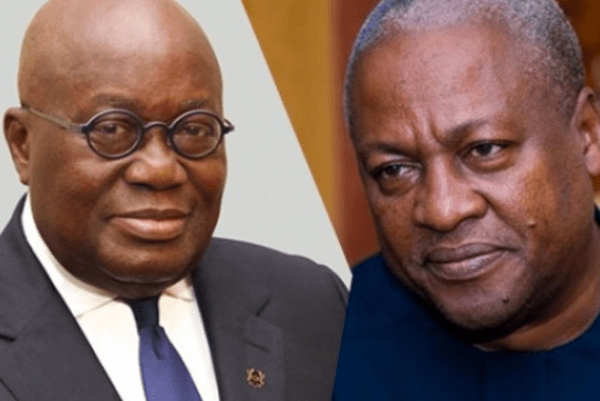The two main contenders for this year’s presidential election, President Nana Addo Dankwa Akufo-Addo of the New Patriotic Party (NPP) and former President John Dramani Mahama of the National Democratic Congress (NDC), will sign the Presidential Elections Peace Pact (PEPP) today to commit them and their parties and supporters to non-violence, the resort to judicial process to seek redress in case of disputes and work towards eradicating vigilantism.
The PEPP process is being convened by the National Peace Council (NPC), the Office of the National Chief Imam, the National House of Chiefs and the Institute for Democratic Governance (IDEG).
The Graphic Communications Group Limited and the Ghana Broadcasting Corporation are the media partners for the programme.
The signing event this morning will be on the theme: “Eradicating electoral violence in Ghana’s democracy: the role of political leadership”.
Context
Peace pacts were signed before the 2012 and 2016 elections, and the signatories committed themselves to working together to tackle electoral violence, impunity and injustice.
However, it was the 2016 peace pact that triggered the implementation of the 2020 commitment regarding the eradication of vigilantism.
It was in response to the violence in the Ayawaso West Wuogon Constituency in January 2019, after which President Akufo-Addo, the NPP and the NDC demonstrated political leadership and concerted action to tackle the menace of vigilante violence in the country.
That commitment resulted in the passage of the Vigilante and Related Offences Act, 2019 (Act 999) and the subsequent adoption of the Code of Conduct and Roadmap Against Vigilante Violence by the National Peace Council (NPC).
Peaceful country
Ahead of the signing today, the Chairman of the NPC, Rev. Dr Ernest Adu-Gyamfi, reminded Ghanaians, especially political actors, to help preserve the peace by toning down the rhetorics of scaremongering.
He said it was important that Ghanaians worked towards maintaining peace and preserving the country’s stability.
“Whoever wins is the winner and whoever loses should be gracious to accept defeat,” he stated.
Due process
Rev. Dr Adu-Gyamfi said if any candidate had issues with election results, the person or political party should use due process to resolve them.
He said the use of due process to resolve electoral disputes was tried in the 2012 presidential elections, which proved to be a test case for the country.
The NPC chairman said the use of the courts to resolve disputes remained the best option to the use of violence.
Supporters
Rev. Dr Adu-Gyamfi, therefore, appealed to supporters of the political parties to calm down and allow the processes to work.
He said the Electoral Commission (EC) had assured Ghanaians of its readiness to deliver successful elections.
“Let us cooperate with the EC. It is important that we cooperate with and allow state institutions to work and discharge their mandate,” he stated.
2020 PEPP
The 2020 PEPP follows the NPC-facilitated dialogue on eradicating vigilante violence which led to the NPP and the NDC adopting the code of conduct and the roadmap for eradicating vigilante violence in Ghana.
Consultations
The Executive Director of the IDEG, Dr Emmanuel Akwetey, in an interview with the Daily Graphic on November 26, 2020 indicated that the objective of the high-level meeting (HLM) which would precede the signing of the PEPP was to convene national leaders who, as peers, would deliberate on the threat of electoral violence to the peace, security and welfare of the whole country.
He said the signing of the PEPP would serve as an instrument for political leaders to demonstrate integrity and a commitment to pursue the path of justice in electoral disputes and avoid electoral violence.
In the pact, Dr Akwetey said the signatories would also commit themselves to working collectively to eradicate electoral violence, impunity and injustice while consolidating peace and democratic stability in Ghana.
Background
In 2012, the first PEPP was signed in Kumasi, dubbed: “Declaration against electoral violence, impunity and injustice”, which was subsequently renamed the Kumasi Peace Pact.
The second PEPP was signed in Accra in 2016 on the theme: “Strengthening Ghana’s democratic stability, peace and unity”.
That PEPP provided a platform for the political parties and their presidential candidates to reaffirm their commitment to the Kumasi Peace Pact and promote the adoption of a road map to sustain post-election political dialogue and consensus on strategic reforms vital to strengthening Ghana’s democratic stability, peace and unity.


